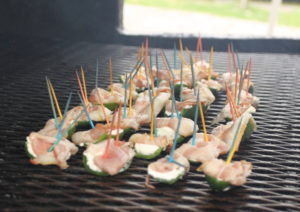 1. Check for critters. If you grill has been hibernating and covered for a few months, there could be some unwant4ed guests lurking. Evict any spiders or other nesting critters and clear out the cobwebs or other debris from the manifolds, burner valves, connectors, etc. Compressed air (available canned if you don’t own an air compressor) is an efficient way to do this.
1. Check for critters. If you grill has been hibernating and covered for a few months, there could be some unwant4ed guests lurking. Evict any spiders or other nesting critters and clear out the cobwebs or other debris from the manifolds, burner valves, connectors, etc. Compressed air (available canned if you don’t own an air compressor) is an efficient way to do this.
2. Clean it. Use a cleaning utensil and soapy water to remove any gunk that has accumulated on the inside or outside of your grill. If you have a wire brush, consider replacing it. The wire bristles can fall off and cause serious injury if ingested. To avoid a trip to the emergency room, use a nylon brush, wooden scraper or grill-cleaning cloth. If you remove the burners and gas tubes for cleaning, make sure to cover their connection points with aluminum foil so they don’t corrode. Once you’ve scrubbed sufficiently, use a towel to dry the grill.
3. Prevent rust. Don’t let April showers disintegrate your grill. Consider painting the exterior of the grill with a rustproof metal paint. If you find existing rust, you can gently scrub it off with steel wool. Parts like handles, knobs and wheels that are beyond saving are inexpensive to replace.
4. Inspect the tank. Run a leak test. Coat the regulator, valves, and hoses with soapy water, then turn on the tank to pressurize the system. Look for bubbles, which indicate escaping gas. Tighten connections and try again; if there’s still a leak, replace the hoses or the tank, if need be. Next, if your grill lacks spider guards, use a bottle brush to clear out debris or insect nests from the venturi tubes, which connect gas to burners. Finally, fire up the burners without the grates in place and look for spots that aren’t flaming evenly. Once cool, clear any blockages in the burners with a paper clip.
6. Clean grease traps. These receptacles collect the fatty deposits that build up in your grill. Make sure to keep them clean because grease can ignite and set your grill (and home) on fire.
7. Cover it. Wind, sunrays and rain wreak havoc on your grill. Leaving a grill defenseless in the elements is inexcusable. The best protection is a good cover made of canvas or vinyl with a cloth lining.
Happy Grilling!!
